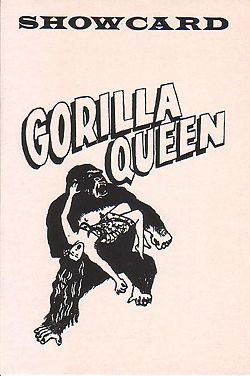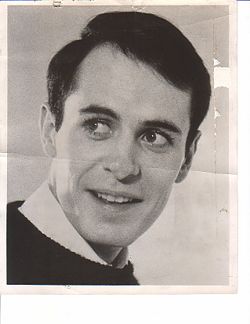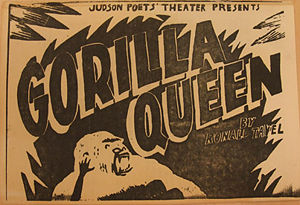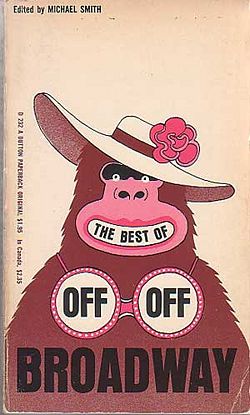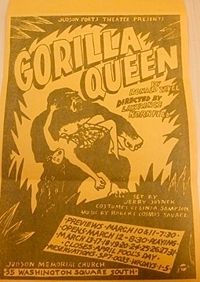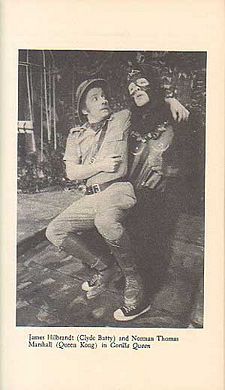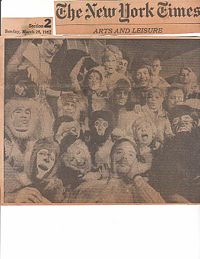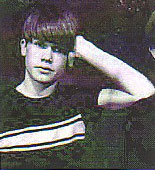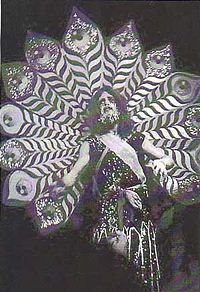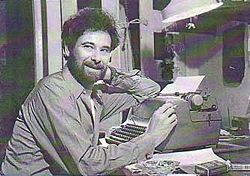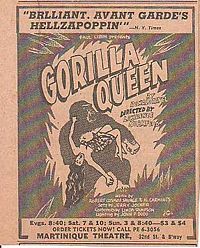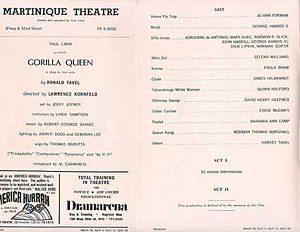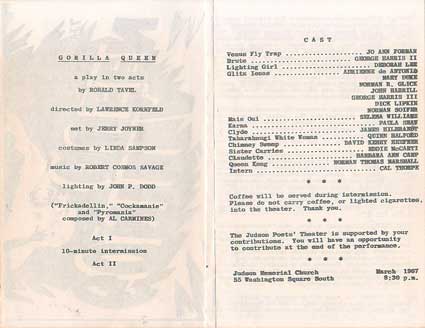David Kerry Heefner: Remembering Ronald Tavel's "Gorilla Queen," March 1967
The Gorilla Was Gay
By David Kerry Heefner
Farce is seldom in good taste, but genitals always are. - Ronald Tavel, GORILLA QUEEN
Ronald Tavel's play GORILLA QUEEN opened at the Judson Poets' Theatre on March 12,1967 after two preview performances, and I was fortunate enough to be there to speak the above line of dialogue, which was often quoted, and to get in on all the craziness and unexpected (sometimes homophobic) attention it received.
The New York Times Sunday Arts and Leisure section of March 26, 1967 declared "In the Parish Hall, the Hippies go Ape."
- "GORILLA QUEEN" is the freest, wildest, most outrageously mannered theatrical diversion to have hit Off-Off Broadway in many a queer-colored moon. While its content, language, and action may confuse, scandalize or bore, no one will be indifferent to its zany originality, its improbable plot convolutions, or its visual and directorial brilliance.... It's a shameless celebration of Hollywood jungle epics, vintage 1940." - John Gruen, The Pop Scene, New York Times, March 26, 1967
When GORILLA QUEEN opened HELLO DOLLY, FIDDLER ON THE ROOF, a revival of SOUTH PACIFIC and CABARET thrived on Broadway. Harold Pinter's THE HOMECOMING won the Tony Award for Best Dramatic Play, and CABARET was selected the Best Musical of 1967. Off-Broadway YOU'RE A GOOD MAN CHARLIE BROWN and a revival of Rogers and Hart's BY JUPITER were hits.
Jean-Claude van Itallie's trilogy of anti-Viet Nam war plays, AMERICA HURRAH, which had opened in 1966 was still playing. Apart from these van Itallie's plays there wasn't much that was experimental or inventive happening in the New York theatre scene, so GORILLA QUEEN surprised critics and the public with its unbridled originality. HAIR would open eight months after GORILLA QUEEN, giving theatre goers a second batch of "hippies" running wild.
- "For what everybody's talking about and indulging in up there, baby, is sex, sex as between man and woman, man and man, woman and woman, man and ape, ape and queen, queen and queen - on and on into endless combinations and permutations." - Jerry Tallmer, New York Post, April 25, 1967
Nobody, author, director or actors expected all the hub-bub that followed the play's opening. There was so much press and publicity that the entire run at Judson Memorial sold out and the play was moved Off-Broadway to the Martinique Theatre. Ronald Tavel, the author of the play, who claimed to have been the first to use the term "Theatre of the Ridiculous" (Charles Ludlam and John Vaccaro claimed the same thing) had attained some fame, or notoriety, writing scripts for Andy Warhol's films SHOWER, THE LIFE OF JUANITA CASTRO, SUICIDE, SCREEN TEST, VINYL, the scripted parts of CHELSEA GIRLS and several others.
- "Attending a performance of GORILLA QUEEN is like being present at a particularly rambunctious drag ball - the evening is as fruity as a nutcake. Emboldened by the popular success of Camp, Pop, and the Underground Film, the homosexual mafia has now decided to advance the sexual revolution another step by exposing its privates in the most public of places, the theatre..." - Robert Brustein, The New Republic, May 6, 1967
I don't recall where I heard that GORILLA QUEEN was being cast, but it was probably in Backstage, the weekly casting publication that actors have relied on for decades. I recognized Mr. Tavel's name in the casting call because I'd met him after a performance of his play THE LIFE OF LADY GODIVA in April, 1966. At that time I was enrolled in a scene study class with Milton Katselas (who would become one of Hollywood's top acting coaches), and was working on a scene from Miller's ALL MY SONS with scene partners Dorothy Opalach, who played Lady Godiva in LADY GODIVA, and had involved our third scene partner, Tom Shibona, who played the sexy Earl Leoffric. The two of them invited me to a loft on West 17th. Street to see the play, and introduced me to Tavel, Charles Ludlam who was making his first New York appearance, and director/actor John Vaccaro. So, seeing Mr. Tavel's name in the casing call and having been delighted with LADY GODIVA, I was lured to the GORILLA QUEEN auditions.
- "The audience at GORILLA QUEEN is composed mostly of Madison Avenue queers on a slumming tour; their laughter is nervous and uneasy. Homosexual theatre in America has hitherto been rather subterranean, and so the openness of this work comes as a bit of shock to those accustomed to the codes and disguises employed on Broadway. Still, for all the refreshing novelty of GORILLA QUEEN, its honesty is not a sufficient antidote to its single-minded sexual emphasis, and I came away from the play feeling as if I had been pounded into the ground by a particularly merciless jackhammer." - Robert Brustein, The New Republic, May 6, 1967
I clearly recall entering Judson Memorial Church, the home of Judson Poets' Theatre, for the first time. And I remember that the casting call was an open "cattle" call, which means no appointments are scheduled and first come first auditioned. However, this day, there were few actors waiting to be heard and not the usual tense, milling crowd. Perhaps they'd had a look at the script and fled. I recall pacing as I read the scene that had been handed me when I was told I'd be reading for the part of the Chimney Sweep, and I remember auditioning with energy, still pacing as I had done while waiting to be called. I didn't know what else to do, as the part of the script I'd been given seemed to lack logic or plot progression. Soon I'd learn just how really original and zany and intelligent this play was.
- "An avant-garde "HELLZ-A POPPIN" - "Outrageous nonsense that impresses you with its energy even when you are doubting its sanity." - Dan Sullivan, New York Times
Then, a few days later I got a call from the stage manager: "Would I please play the role of the Chimney Sweep." No pay, no benefits, but the Judson Poet's Theatre and Ronald Tavel's writing were intriguing and anyway nobody else was offering me paid work, so I said I'd take GORILLA QUEEN on.
Rehearsals started a few days later, and from the first minute I could see no one in the large cast had ever worked on a play structured like Gorilla Queen, which was structured so that it looked unstructured. The unexpected was the norm. Having graduated just a few years before from Goodman Theatre School of the Art Institute of Chicago where Stanislavsky and character motivation ruled, I was trained in and believed in getting inside a role and understanding what a character wanted to achieve. Lawrence Kornfeld, our director and a long time director for Judson Poets', didn't work that way - certainly not on this script anyway. He would think up, on the spur of the moment, physical activities to keep the characters moving, and ignored what their logical motivations might be.
- "GORILLA QUEEN" is one of the most insane plays I've ever seen, even counting other works by Ronald Tavel. Crammed into the camp form of a movie musical is a farcical treatment of ultra serious themes. Two whole civilizations, the scum of the jungle and cream of Hollywood, are tossed about in a whirlpool of philosophy. Beast and movie star couple in grubby lust. All the climaxes are in the wrong places, and dualisms multiply until the tragic ending is only a pretext for another happy, or at least manic, beginning." - Michael Smith, The Best Of Off-Off Broadway
I had a long scene with a character named Karma Miranda, who wasn't dressed to ape Carmen Miranda, but wore a shepherdess' outfit, and despite that fact sang a musical number entitled Man Garantuan Girl. I was dressed in black tights, a tight black turtleneck shirt, both covered with black sequins (which I'd sewn on the costume by myself as there was no costume crew), a stovepipe hat, green satin sash and high boots, and carried a broom and a bright green plantain. Of course I had my plantain (penis) with me wherever I went, pointing it at the other characters. Karma and I wore pale makeup for we had been inspired by the two porcelaine figurines in Hans Christian Anderson's tale, THE SHEPHERDESS AND THE CHIMNEY SWEEP, which had clearly left a lasting impression on our author.
"The audience is perched precariously on folding chairs in the dusty, rickety choir loft at the Judson Memorial Church in Greenwich Village. Suddenly an actor, dressed in garish, anthropoid makeup, vaults over the railing and stomps through the startled spectators onto the stage. Snuffling and grunting like a deranged chimpanzee, he sticks his tongue out at the audience, grinning, scratching and chattering in a stream of missing-link 'hooga-moogas.' Thus begins Ronald Tavel's "GORILLA QUEEN," a hairy, horny spoof of these muddled times, done as a parody of the Maria Montez jungle flicks of the 40's" - Mel Gussow, Newsweek, May 1, 1967
There was no read-through of the play, which usually happens at the first rehearsal of a new production, nor was there any discussion of character, style or theme by either director or author, at any time. Karma Miranda and I had a scene sitting at a rattan table, where I was putting the make on her. Out of the blue our director told us to turn our chairs front and place them close together, then sit on them as if we were in the front seat of a jeep. I was to mime steering the vehicle while the two of us swayed back and forth and bounced up and down as if driving at very high speed on a pot-holed, twisting road. This blocking made it very difficult to play my motivation, which was to find out if Karma was a gorilla in disguise. She looked nothing like a gorilla, but don't look for logic in this play.
- "GORILLA QUEEN is what happens when you take freedom of expression a little too seriously. Everything's fine when you let the kids play down at the Judson Poets Theatre. If the camping is a little dated who cares? -sentiment runs high down on Washington Square. And if the queens are in last year's drag and the pop art-Thirties movies-fageroo is slightly curdled Andy Warhol, well take it easy. The boys are having fun and friends are in the house." - Martin Gottfried, Women's Wear Daily, April 25, 1967.
When not interacting with Karma, I spent quite a bit of stage time with the Venus Fly Trap, a petit beauty named Jo Ann Forman. Caught in her spell I "danced" around her. Then the two of us writhed sensually until she enveloped me, eventually depositing me on the floor, where I lay for about half an hour. Then I was resurrected and back in the middle of things for the remainder of the play.
One matinee as I lay at the feet of the Venus Fly Trap, supposedly unconscious, I spotted Alfred Hitchcock alone in the front row. The Martinique theatre was small with a thrust stage. The audience was on three sides, and no adjustments were made to the blocking we'd had at Judson Poets', so some part of the audience always missed bits of the action. When I came back to life and was back on my feet I couldn't help but notice that Mr. Hitchcock was asleep or at best resting his eyes. So I wasn't discovered that day.
The musical numbers were never really staged. Each of us did our thing and invented. For the final musical sequence, after my reanimation, I was happy to rely on my prop broom. With no staging given me, I invented a variety of ways to spin, dance with and toss my trusty broom.
The production needed a strong central performance, and was very fortunate in finding Norman Thomas Marshall to play Queen Kong. Norman was built like a football player, as masculine as a hundred locker rooms, and played the role with physical ease, sweetness and charm. No matter what colorful words came out of his mouth he remained lovable. He was trapped in a heavy gorilla costume and sweated nonstop, but remained light on his feet throughout. He would later found the Off-Off Broadway theatre company, No Smoking Playhouse, and produce frugal but excellent revivals.
And I was delighted at the first rehearsal to see that Eddie Mc Carty (Mc Carti) was also in the cast, to play Sister Carries, a combination male nun and witch doctor. I'd met Eddie four years before, when I'd first arrived in New York City, and we'd been introduced by a good friend who was also from Decatur, Eddie's home town. Eddie had won an Obie Award earlier in 1967 for his performance in Tavel's KITCHENETTE. He played the piano well and that was a good thing as it kept GORILLA QUEEN alive.
Music for the play had been composed by Robert Cosmos Savage, but it was decided that his work was perhaps too tasteful and controlled and that more uninhibited stuff was needed. So Al Carmines, Judson Memorial Church's Associate Pastor and resident prolific composer was brought in.
Al quickly whipped out the songs "Frickadellin", "Cockamanie", "Pyromania" and "Ay Yi Yi", all of which teemed with campy energy. Mr. Savage played the music he'd written on piano for performances, with Mr. Carmines relieving him for the pieces he'd written. After a couple of weeks though, Mr. Carmines could no longer be present at the performance. Eddie Mc Carty took over all the piano playing in addition to his manic portrayal. He'd play a scene, then run frantically to the piano and pound out the music. Some scenes he played from the piano bench. The sweat dripped off him visibly. Unfortunately the very talented Eddie Mc Carty died just a few years later, and word was he had committed suicide.
An actress named Florence Tarlow was cast in the role of Karma. Florence was well known in the Off-Off world and had won an Obie Award in the 1965-66 season for her performances in ISTAMBOUL, RED CROSS and A BEAUTIFUL DAY, all staged at Judson Poets' Theatre. Since I spent a good bit of my stage time with Karma, I worked to get along with Florence, who was about twenty years older than me, more experienced and perhaps twice my weight. She was always pleasant and businesslike, but all work and not much laughter, and when the director asked me to sit on her lap for part of our scene, I followed his direction. Our rising from sitting positions was supposed to happen with a rambunctious spin, during which Florence held my arms and hands so tightly that I was spotted with bruises and fingernail scrapes for weeks. Sometimes in her efforts to get this maneuver right, she would butt me with her hips; she seemed to approach the physical part of rehearsal as a football player approaches a scrimmage. A few days into our Judson Memorial performances, Florence got a paid acting job and left us. A brave and talented actress named Paula Shaw was brought in to replace her, and learned the part, with songs, in about three days. Paula had control of her nails and grip and didn't butt me with her hips, so we got along nicely and the brusing ceased.
- "Among its other concerns are religiosity, mock sacrifice and Western mores. I don't know if it matters but the plot has to do with the search for and discovery - in Nigeria? Brazil? Angola? - of Queen Kong, a large gorilla whose interesting proclivities either demonstrate that we all came up from the apes, as Darwin said, or vice versa, In "GORILLA QUEEN" all vice is versa." - Jerry Tallmer, New York Post, April 25, 1967
One of the best things to come out of working in GORILLA QUEEN was the friendship that developed between me and George Harris III, who played one of the chorus of Gibbons called Glitz Ionas. George III and his father George II were both in the cast, and were regulars in the Off-Off scene. George III had the space next to me at the makeup table and our conversations led to hikes, movies, lunches and laughter. George, who was a reserved, conservatively dressed seventeen year old at the time, was mature for his age (he had a twenty seven-year-old architect lover), and his parents and siblings, all of whom were involved in theatre were true "hippies." Just a year after GORILLA QUEEN, George III would move to San Francisco, put on wild costumes, cover his face with glitter, rename himself Hibiscus and create the Cockettes. Several years later, during the time I was Producing Director of Hudson Guild Theatre, his photo arrived, without glitter, from one of the major actor's agencies as a submission for something we were casting. The attached resume declared him to be Brian Wolf. When audition time came he wasn't available. Sadly he died of HIV related illnesses in May of 1982. He was thirty two years old. What a loss of imagination, creativity and sweetness.
- "Gorilla Queen" a Musical, Begins Run At Martinique.
- Ronald Tavel's "Gorilla Queen" opened last night at the Martinique Theatre. Mr. Tavel's "musical extravaganza" with songs by Al Carmines, was originally given at the Judson Poets Theatre in March" - New York Times
Yep, GORILLA QUEEN was optioned and moved from Off-Off-Broadway to an Off-Broadway contract and theatre, the Martinique at Broadway and 32nd. Street. Paul Libin, already an established producer, was responsible for the move and placed us under contract, with pay! Whoda thought? Mr. Libin has since produced over 250 productions on Broadway, Off-Broadway and on tour He was Producing Director of Circle in the Square Theatre for 27 years, President of the League of Off-Broadway Theatres for thirty years, is President of the Circle in the Square Theatre School and Broadway Cares/Equity Fights AIDS, and is still a very active producer.
One night after a performance, while we still playing on Washington Square South, George III and I started off to get something to eat at a nearby diner. We met a fellow actor on the way, who told us that Joe Chino (cafe-owner and one of the first producers of what would come to be called Off-Off Broadway theatre) while on an LSD trip and bereft at the recent death of his lover, Jon Torrey, had stabbed himself in an attempt to commit suicide. He was in intensive care at St. Vincent’s Hospital and needed blood badly. Off we went to St. Vincent’s, only to find out that much more blood than was needed had already been donated. Joe Cino didn't survive and died on March 30, 1967, and the Caffe Cino perished less than a year later.
While researching this piece, I was saddened to learn that Ronald Tavel had died on March 23, 2009 while flying home alone to Bankok from a conference in Berlin. He had lived in Thailand for twelve years. He was 72 years old. The New York Post added its sensational slant to his obituary, creating its own theatrical ridiculousness and reporting that he had been "fascinated by the dark arts, which he began weaving into his avant-garde work in the late '80s.".
"NEW YORK POST - April 2, 2009
- SATANIC SCRIBE'S EERIE DEATH.
- Did black magic and a curse play a role in the death of Ronald Tavel - the Obie-winning playwright and Andy Warhol collaborator who mysteriously died aboard a Thailand-bound jet last week?
Ronald Tavel was born in Brooklyn on May 17, 1936. He graduated from Brooklyn College and received a master's degree in creative writing from the University of Wyoming. In addition to his screen plays for Andy Warhol, he wrote 41 stage plays, and received Obie Awards for his BIGFOOT and BOY ON THE STRAIGHT-BACK CHAIR. He served as Artist-in-residence at Cornell University and at Yale University, and was Distinguished Visiting Assistant Professor in Creative Writing at the University of Colorado at Boulder. He was a wonderfully imaginative writer who wasn't afraid of taking chances.
Backstage after the final performance of GORILLA QUEEN, Ronald asked me why I had never performed the Sweep the way I'd auditioned for the role. I asked him how the performance was different from the audition. He told me that when I auditioned I'd played the part as if I were a Nazi interrogator.
Well, knock me down! News to me! Even if I'd been aware that's how I'd been perceived, the director led me far away to a much lighter more energetic interpretation. I wish Ronald had mentioned the Nazi thing while we were in rehearsal; I could have played the role in a way that would have pleased him more. Alas.
When I think about 1967 and GORILLA QUEEN I know how fortunate I was to be one of those hippies cavorting in the choir loft. It was a good time and there was only positive energy in the experience. There were many people involved in the production: 19 actors, three designers, two composers, a director and a playwright, a commercial producer with press representatives and general managers, yet there was never an upset. There were no prima donnas, nobody was self-absorbed.
Homophobia was scattered throughout revues and feature stories of GORILLA QUEEN. In those days critics felt comfortable referring to gay people as "the homosexual mafia" as Robert Brustein did in The New Republic, and in writing that "the homosexual mafia has now decided to advance the sexual revolution another step by exposing its privates in that most public of places, the theatre." Almost seems he's referring to actual nudity. There was none in the play. Brustein continues with "Inversion, in fact, is not only the entire subject of this playful author: Tavel uses the theatre exclusively for the purposes of advertising queerdom. Homosexual exhibitionism is given full rein..." And Martin Gottfried could mock gays in the Women's Wear Daily with: "Believe me, darling, I'm the last one to put down Cherry Grove. But really, Marianne sweetie, when the end-of-season show is being given in April, I mean where do we go from here?" I doubt that either of these writers would even consider expressing themselves in these word nowadays. The world has changed, somewhat.
